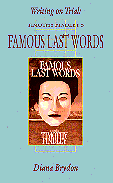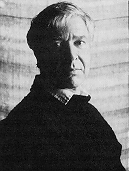


|
Writing on Trial: Timothy Findley's Famous Last Words.
Diana Brydon.
Subject Headings:
Grades 12 and up / Ages 17 and up.
*** /4
|

excerpt:
Famous Last Words emphasizes interpretations and the multiple possibilities for making meanings that arise from our individual interactions with its textual constructions of our past. But it also insists that interpretation must lead eventually to judgement, to the taking of stand, through for each of us that stand may be on different ground.
 In Writing on Trial, Diana Brydon, who teaches Canadian and postcolonial literature at the University of Guelph, examines Timothy Findley's Famous Last Words. This short book in the "Canadian Writers Series" is both a good critical examination from Brydon, herself, as well as a wide-ranging look at other critical opinions assembled by her (though some of these don't get as full a hearing as this reviewer would like).
In Writing on Trial, Diana Brydon, who teaches Canadian and postcolonial literature at the University of Guelph, examines Timothy Findley's Famous Last Words. This short book in the "Canadian Writers Series" is both a good critical examination from Brydon, herself, as well as a wide-ranging look at other critical opinions assembled by her (though some of these don't get as full a hearing as this reviewer would like).
In the film Metropolitan, which is about a group of Manhattan rich kids, one of the boys explains that he only reads good literary criticism but not the book the criticism is about. With good literary criticism, he says, it's like reading the book without having to read it. The girl to whom he expounds this theory is incredulous and contemptuous of it. I suspect Ms. Brydon would be as well, though it is a popular assumption today. The clear assumption from her study is that you should have read Famous Last Words, and better have read it, if any intelligent discussion is to take place. The irony here, of course, is that Famous Last Words deals with (brilliantly, I think) historical characters and various theses of how a particular history happened: most people feel they can postulate some opinion because they will have heard at least part of the 'real' story, and that surely seems available for everyone to comment on, even if they haven't read a book, namely Findley's, on it. Ms. Brydon deals with the 'real' story as well as explicating Findley's artful use of it with balance and insight. In particular, her description of the lead character's "testament" and argument of the novel (pages 37-39 in Writing on Trial) is masterly.
Brydon's main technique, right for this book, is, as she puts it, stresses "its (Famous Last Words) reliance on intertextuality, by which I mean the way that one text assimilates, echoes, and incorporates words, images, and ideas from other texts". Sometimes this leads to a good insight followed by muddled thinking, but, in trying to encompass so much, this is bound to happen.
No matter. Brydon's reading is a careful, surefooted, if sometimes prosaic, critique; perhaps overview is more accurate. It will give you a sense of the book, and how one may approach its complexities. In some ways, Famous Last Words is a labyrinth of a novel. Writing on Trial might provide a good road map into, if not through, it.
Recommended.
Rory Runnells is the Executive Director of the Manitoba Playright's Association.

To comment on this title or this review, send mail to cm@umanitoba.ca.
Copyright © 1997 the Manitoba Library Association. Reproduction for personal use is permitted only if this copyright notice is maintained. Any other reproduction is prohibited without permission.
Published by
The Manitoba Library Association
ISSN 1201-9364
TABLE OF CONTENTS FOR THIS ISSUE - September 19, 1997.
AUTHORS | TITLES | MEDIA REVIEWS | BOOKSHELF | BACK ISSUES | SEARCH | CMARCHIVE | HOME